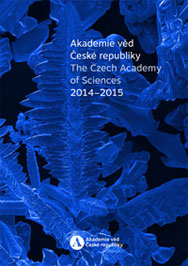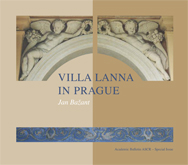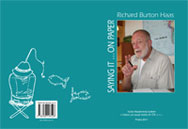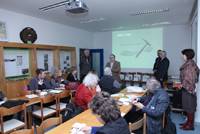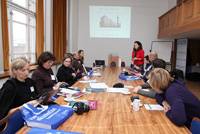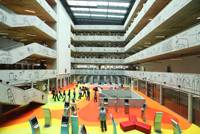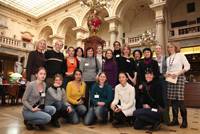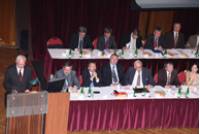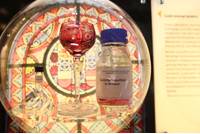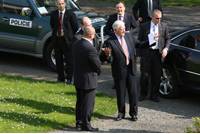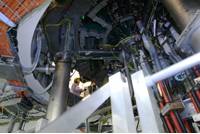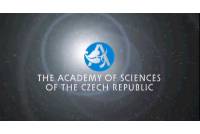The S.I. Vavilov Institute for the History of Science and Technology of the Russian Academy of Sciences that was in 1991 named in honour of S.I. Vavilov, the prominent Russian botanist and geneticist and was also engaged in history of science, celebrated eighties anniversary. Recently discovered archive documents established that the Institute was created on February 28, 1932. By this occasion the international assembly took place in Moscow on February 28, 2012 and at the end of the festive meeting the foreign guests and some Russian scholars were awarded a Medal for Contribution to History of Science. One of them was president of ESHS Soňa Štrbáňová from the Institute for Contemporary History ASCR.
The main speaker was the Director of the Vavilov Institute Yuri Mikhailovich Baturin, Corresponding Member of the Russian Academy of Sciences and Professor at the Moscow University, whose incredible career deserves a few extra words. Prof. Baturin graduated in 1973 from the Moscow Institute of Physics and Technology and in 1980 got a PhD in law at the Moscow State University. His third profession is journalism and in the 1990s he became politician as the national security assistant to the Russian President Yeltsin. He has made contributions to the realm of aviation physics, cybernetics, law, journalism, international aerospace law, and forecast of aerospace, but internationally famous became as astronaut participating in two spaceflights: Soyuz TM-28 in 1998 as Research Cosmonaut and Soyuz TM-32 in 2001 as Flight Engineer. His accomplishments earned for him the Russian Hero medal. Baturin edited several books about Russian cosmonautics and wrote a popular book about the everyday life of the Russian cosmonauts.
The invited foreign guests of the celebration were Prof. Liu Dun (China) as President of the Division of History of Science and Technology of the International Union of History and Philosophy of Science; Prof. Eberhard Knobloch (Germany) as President of the International Academy of History of Science; Prof. Loren Graham from the MIT (USA), Prof. Boris A. Malitskij, Director of the G.M.Dobrov Center for Scientific and Technological Potential and Science History Studies of the National Academy of Sciences of Ukraine; Prof. Ou Bao (China) from the School of Humanities and Social Sciences Tsinghua University in Beijing; and the author of this account representing the ESHS as its President.
For the jubilee, a small but well documented exhibition on the Institute and its achievements was prepared. There was also a fascinating show of three-dimensional documentary movies made by the Institute’s Centre for Virtual History of Science and Technology. These films were presenting, for instance, plasma crystal experiments conducted on the International Space Station and the process of spacecraft docking. One of the 3D films belonged to the series in progress on eminent Russian scholars. The Vavilov Institute commemorated its anniversary also by an illustrated brochure, which contains the short history of the Institute and an overview of all departments and centres with the description of their programmes.
In the following days, the foreign guests had the opportunity of meetings with Russian historians of science, many old friends among them, and the governing staff of the Presidium of the Russian Academy of Sciences. The attentive care and hospitality given to the guests of this festive event had a specific undertone, which reflected the great effort of the Institute to establish and re-establish close bonds to the international community of historians of science. This endeavour also stands out in the light of the interview Prof. Baturin gave on the day of the celebration to the journal Rossiiskaia Gazeta. Under the title “History of Science is Expecting its Shakespeares”, he recalled the history of the Institute, stressed the exceptional significance of history of science and technology for Russia and spoke for the necessity of greater attention to this field. He also mentioned the Institute’s ups and downs. In 1932, the was appointed Nikolai Bukharin the first director of the Institute who became one of the prominent victims of the Stalinist trials. After his arrest and execution in 1938, the Institute was closed, and reopened again in 1944 thanks to the intervention of the famed geologist V.V. Vernadskii and chemist N.D. Zelinskii. Another victim of Stalin’s purges Vavilov, whose name the Institute carries, died in prison in 1943. The 1970s and 1980s represented the “golden age” of the Institute when it received great attention from the Academy authorities and achieved a high international reputation. At present, the Institute has along with the St. Petersburg branch about 200 co-workers, but since the 1990s the crisis of the Russian science significantly affected its actions. The Institute had to move out from its building in Moscow centre to unsuitable premises and has to fight for its recognition. Prof. Baturin expressed in the interview his position in this situation: “I consider my main duty to regain the same status and prestige to the Institute, which it had in the 70s and 80s.”
From material of Soňa Štrbáňová (Institute for Contemporary History ASCR).
22 May 2012
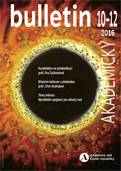

 Česky
Česky


